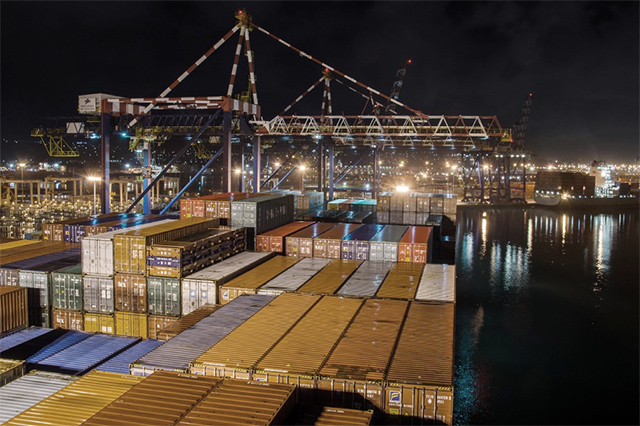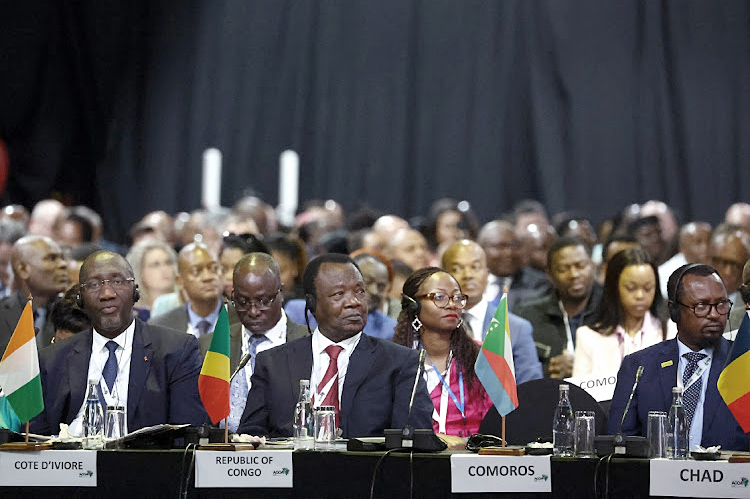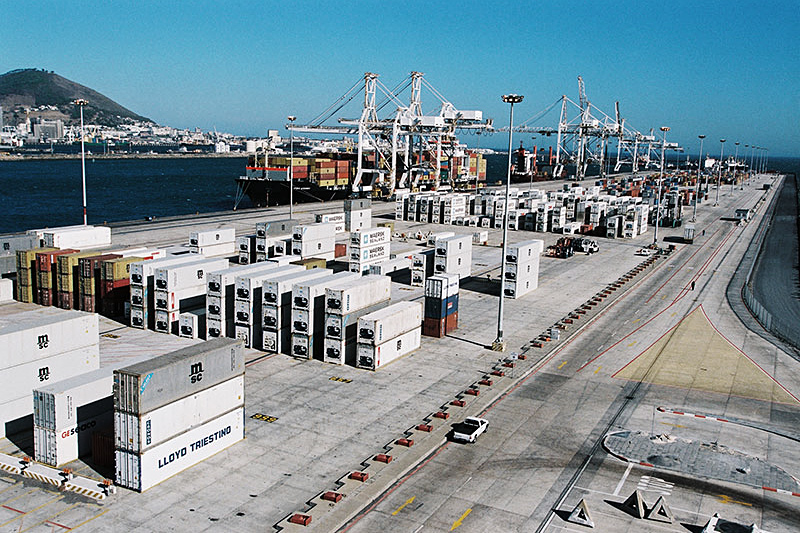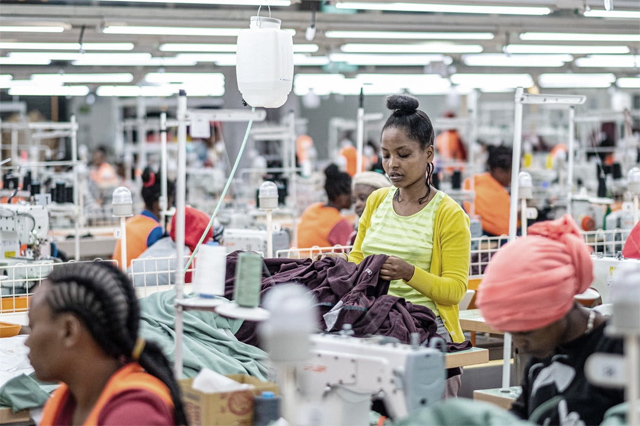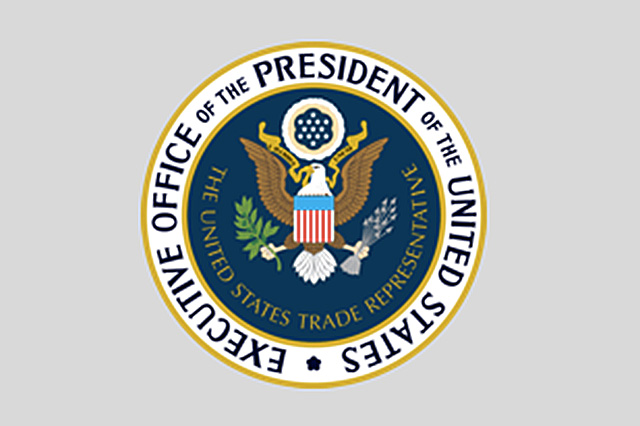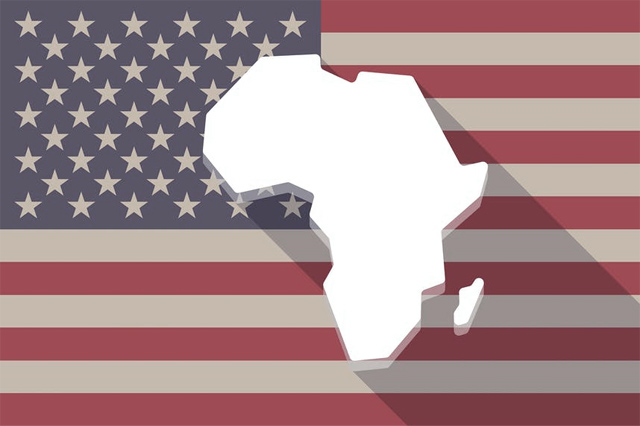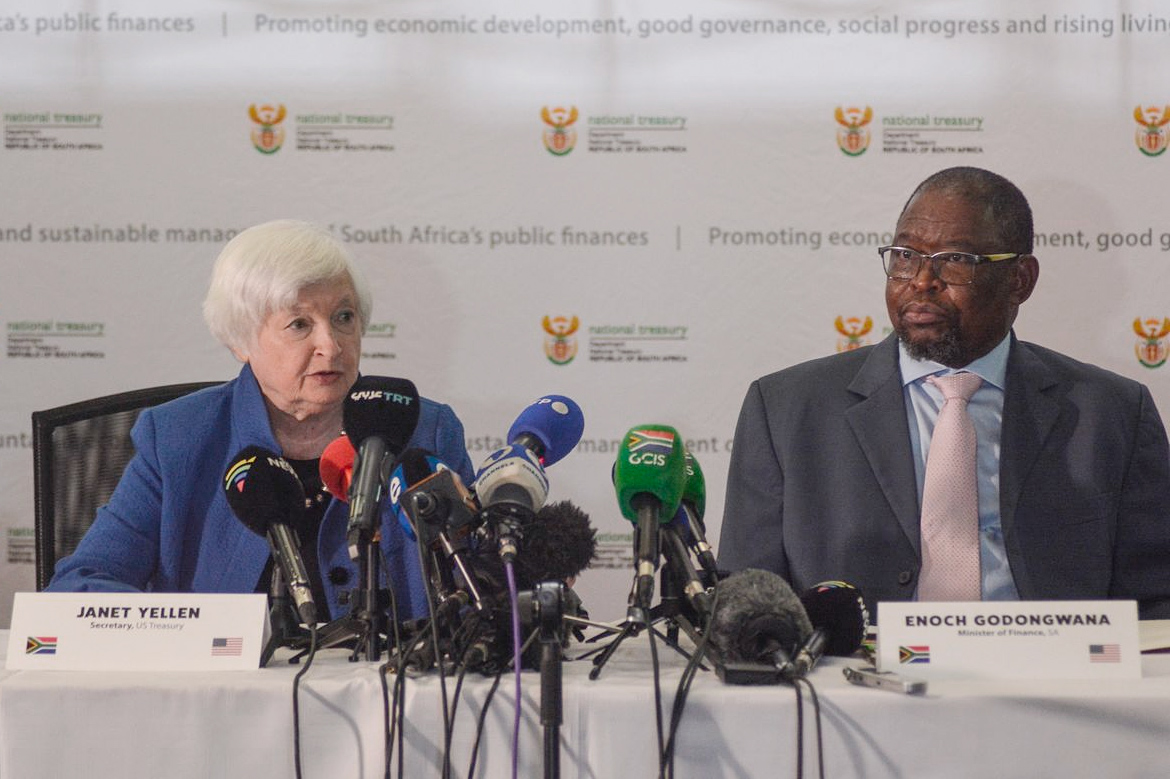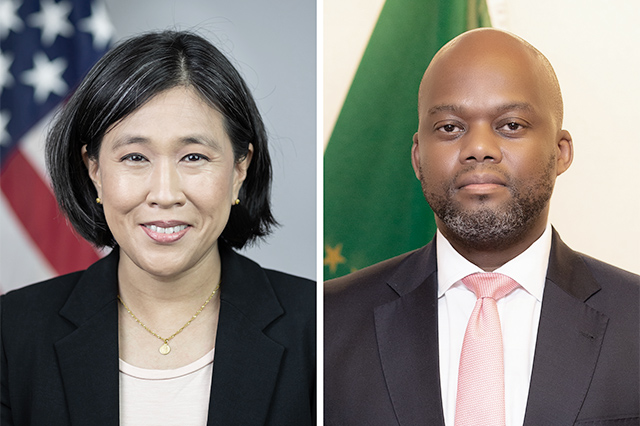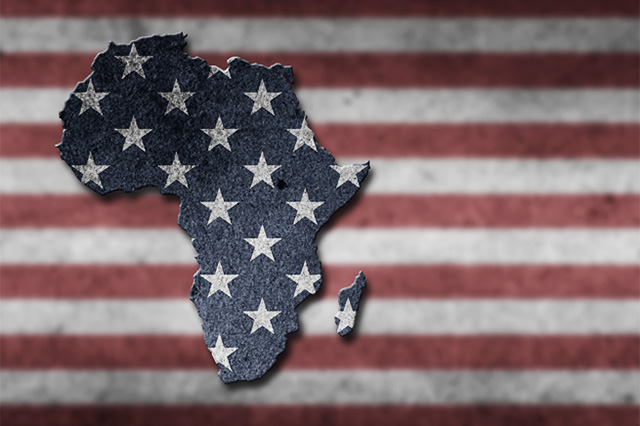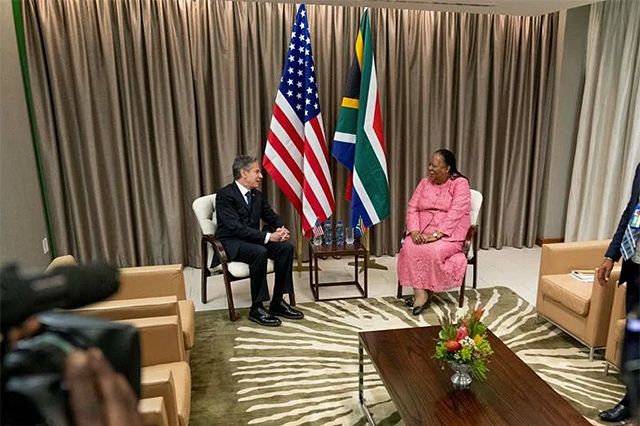Looking forward: US-Africa relations [incl. Video]
Editor's Note: On March 26, 2019, Brahima Coulibaly testified before the U.S. House of Representatives Subcommittee on Africa, Global Health, Global Human Rights, and International Organizations. His written testimony on Africa's rapid transformation and U.S.-Africa relations follows.
Thank you, Chairwoman Bass and Ranking Member Smith, for your leadership with respect to U.S. engagement with Africa.
Your active role in fostering the bipartisan cooperation that has historically characterized U.S.-Africa legislation is exemplary. Thank you to the members of the subcommittee for the opportunity to testify on the way forward for U.S.-Africa relations.
I am Dr. Brahima Coulibaly, senior fellow and director of the Africa Growth Initiative at the Brookings Institution.
This is an opportune time to re-examine the future of U.S.-Africa relations because there is an emerging consensus, which I share, that the U.S. is falling behind in Africa. In my view, this is not because U.S. policies toward Africa have failed, but rather because Africa is transforming rapidly and the architecture of the United States’ engagement is not adapting fast enough to this dynamism and to the evolving aspirations of African countries.
AFRICA IS TRANSFORMING VERY FAST
Following a period of political and social instability as well as weak economic growth, Africa’s fortunes began to turn around the year 2000. Since then, economic policies and business environments on the continent have, for the most part, improved significantly. Today, institutions are increasingly resilient and good governance is spreading. Most notably, Africa has embraced the digital revolution. For example, the number of mobile phone subscriptions in sub-Saharan Africa increased to 75 per 100 people in 2017 from less than 2 in 2000.
The advent of information and telecommunication technology is enabling economic and social inclusion, as well as unleashing innovation and entrepreneurial potential across the continent. These factors—along with a favorable external environment, notably debt relief and higher commodity prices—have contributed to strong economic growth over the past two decades. In addition, the middle class is expanding and is boosting consumer and business spending, at a rate of almost 4 percent a year.[1]
This momentum is expected to continue alongside sizeable demographic changes. Over the next five years, half of the world’s 10 fastest-growing economies will be on the continent, and Africa’s middle class will expand from 245 million to 380 million people over the next decade.[2] The youth bulge will have even more significant consequences: Over the next three decades, the youth population will increase by over 500 million—more than offsetting the declines in youth populations outside of Africa—and doubling the region’s overall population by 2050.[3]
Urbanization has also been very rapid: The number of cities with 5 million or more inhabitants will triple to 17 over the next 10 years.[4] This rapid population growth and urbanization is increasing demand for goods and services, as well as for infrastructure in various sectors such as housing, health, transport, and power. Africa’s infrastructure financing needs are sizeable ranging from $130 billion to $170 billion per year, about two-thirds of which is currently unfunded.[5]
Meanwhile, to better respond to the growing needs and demands of the populations, Africa’s leadership and institutions are becoming more assertive in the ownership and advancement of the continent’s agenda. The region’s countries, through the African Union, adopted a common long-term plan—known as Agenda 2063—that outlines their economic and social vision and aspirations over the next several decades. Chief among its priorities is the need for greater integration of the region’s markets and populations.
Under the leadership of the African Union, regional integration is advancing, specifically through policies in support of the free movement of Africans across the continent and the African Continental Free Trade Agreement (AfCFTA). The AfCFTA, now one year old, aims to create a single African market of over 1 billion consumers for goods and services.
This unprecedented dynamism is creating tremendous commercial opportunities in trade and investment, and it is not an exaggeration to say that Africa is on course to be the world’s next big growth market.[6]
How much of Africa’s potential is realized depends on its success in addressing lingering and future challenges. Parts of Africa continue to struggle with the effects of climate change, extreme poverty, state fragility, and insecurity. Democracy is consolidating, although tensions and, in some countries, violence around elections point to areas for improvement. Despite progress on governance, more efforts are needed to eradicate corruption and elevate the voice of women and young people in decisionmaking.
The demographic tidal wave looms closer, and job creation has not yet been able to catch up, contributing to emigration.
WHY AFRICA MATTERS FOR THE UNITED STATES AND THE REST OF THE WORLD
Of the challenges outlined, the demographic boom is the most consequential. By the turn of this century, Africa will be home to 40 percent of the world’s population, or 4.4 billion people, according to United Nations population projections. That is more than double the populations of Europe, North America, Oceania, and Latin America and the Caribbean combined. At the same time, populations are aging elsewhere, notably in advanced economies and several Asian countries. As a result, 42 percent of the global working-age population will be in Africa, providing a large offset to this elderly bulge.
This is a great opportunity for Africa and the global economy if this large labor force is equipped with the necessary skills for the jobs of the 21st century and beyond. As healthy and productive members of the global economy, this workforce will significantly expand global economic opportunities; the African middle class will expand exponentially and create tremendous market opportunities for the benefit of all.
If, on the other hand, Africa does not overcome its development challenges, does not impart its young people with the education and skills of the future, and does not create enough good quality jobs for its young people, then the youth bulge, which should be a global economic asset, could become a global liability. We could experience mass unemployment among millions of desperate young people, leading to widespread social and political instability the likes of which we have not seen before. Migration challenges will rise multifold, as will insecurity, given the prevalence of state fragility in parts of Africa.
Terrorist organizations such as Boko Haram, al-Shabab, and al-Qaida in the Islamic Maghreb, among others, will exploit this instability. Given that terrorism is global and increasingly sophisticated, no country will be immune from the consequences of a significantly deteriorated security situation in Africa.
Although the scenarios I have laid out assess the situation by the turn of the century, which may seem very far away, action is needed now. The actions we take or do not take over the next few years will determine which of the two scenarios materialize, and the problems or opportunities associated with each scenario will play out long before the end of the century.
In the end, U.S. engagement with Africa is not good just for Africa, but for the U.S. too. As the first World Bank president, Eugene Meyer, put it, “Prosperity, like peace, must therefore be viewed as indivisible. And even from the narrowest considerations of self-interest, each of us must be concerned with the economic development of the world as a whole. For we shall prosper individually only as we prosper collectively.”
UNPRECEDENTED FOREIGN ENGAGEMENT IN AFRICA IS SHIFTING TIES
The opportunities that Africa presents and, to some extent, the transnational threats originating from the region have generated unprecedented interest from an increasingly diverse group of global partners looking to proactively strengthen diplomatic, defense, and commercial ties with the continent.
In this “new scramble for Africa,” as the Economist magazine labelled it, more than 300 new foreign embassies opened in Africa between 2010 and 2016, the largest embassy-building boom ever, led by nontraditional actors.[7] For example, Turkey opened the highest number of embassies, followed by Qatar and India. Commercial ties with Africa are also shifting.
Between 2010 and 2017, Africa’s trade has risen particularly fast with Russia, Thailand, Turkey, Indonesia, and China. Meanwhile, trade with Japan and several European countries declined, and trade with the United States more than halved. In 2000, the U.S., France, and Italy were Africa’s top three trading partners, in that order. In 2017, the top three trading partners were China, India, and France. The U.S. still has the largest amount of foreign direct investment in Africa as of 2016, but that U.S. investment has barely increased since 2010.
By contrast, investment from some other countries has increased significantly, with that of China rising twofold over this period. Along with increased diplomatic and commercial engagement, defense ties with nontraditional actors have also deepened and more countries now possess outposts in Africa.
US POLICIES AND PROGRAMS TOWARD AFRICA HAVE BEEN IMPACTFUL
Past U.S. policies and programs toward Africa, which have benefited from bipartisan support in Congress, have been positive and impactful overall. The African Growth and Opportunity Act (AGOA) has boosted trade between the U.S. and Africa, and created thousands of jobs in Africa as well as in the United States.
The U.S. trade and investment hubs in Africa are facilitating intraregional as well as U.S.-Africa trade. The president’s Malaria Initiative has benefited almost 500 million people and caused a significant decline in malaria cases, and the President’s Emergency Plan for AIDS Relief (PEPFAR) has helped contain the scourge of HIV/AIDS. Feed the Future boosted crop yields and has saved 5.2 million from hunger. Meanwhile, through Power Africa, more than 12 million homes and businesses have gained electricity connections since 2014, and the program is on track to reach the goal of 60 million connections in 2030. The Millennium Challenge Corporation (MCC) is also providing tailored, country-specific support for economic growth and poverty reduction.
The Young African Leaders Initiative (known as YALI), has trained about 4,000 of the next generation of African leaders, and created a vast network among them across almost 50 countries. YALI anticipates the rise of African youth and facilitates ties among these future leaders and with the United States. In this way, Congress and the administration should continue to support cultural and educational exchange for Africa’s youth as well as for young Americans to enhance their understanding of the continent.
Each summer, we have been privileged to host at Brookings a cohort of the fellows. My colleagues and I have been impressed by their energy, creativity, and commitment to the greater cause of the continent.
THE NEED TO REFINE THE FRAMEWORK FOR US-AFRICA COOPERATION TO KEEP UP IN AFRICA
While past U.S. policies toward Africa have been impactful, the architecture of the U.S. engagement requires modifications to keep up with the dynamism on the continent and the aspirations of the African people. In this regard, I would submit the following as priority areas for action and as guiding principles for an enhanced U.S.-Africa cooperation.
First, the United States should articulate a clear, comprehensive bipartisan long-term vision for its U.S.-Africa policy following broad consultations with key stakeholders, including U.S. and African businesses, and the African Union. Given the interdependencies between defense, diplomacy, and development, the vision should flexibly balance engagement on all three dimensions, but with a greater emphasis on the commercial ties with the potential to yield the most mutually beneficial outcomes.
The BUILD Act and the U.S. International Development Finance Corporation that will soon replace the Overseas Private Investment Corporation have the scope to significantly transform U.S.-Africa relations, and are an important step in this direction.
Given the expertise of U.S. companies in infrastructure development and the critical role of infrastructure in Africa’s development, I see this sector as a key priority area in U.S.-Africa relations. As noted earlier, Africa has very large infrastructure financing needs of $130 billion-$170 billion a year, two-thirds of which is currently unfunded.
The economic benefits to Africa from improved infrastructure are substantial—up to 2 percentage points in income per capita growth.[8] The empowerment of young people and women is another important area for the future of Africa, and hence U.S.-Africa relations, and should be considered among the priority areas for engagement.
To ensure that this vision is in accordance with Africa’s aspirations, it should align, to the extent possible, with the Africa Union’s Agenda 2063 and the United Nations’ Agenda 2030, which encompasses the United Nations’ Sustainable Development Goals (SDGs) that African countries adopted. China and the European Union have already taken these steps.
At the same time, indications suggest that the U.S.’s current bilateral, country-by-country approach does not reflect the preferences of the continent for a regional approach, consistent with the AfCFTA. In the planning for the Post-AGOA U.S. trade policies with Africa, it would be important to consider the regional approach.
Second, the U.S. will benefit from leveraging USAID’s regional trade and investment hubs more to strengthen U.S. commercial engagement on the continent, and from a high-level White House coordinator for U.S. commercial policy in Africa. Currently, USAID has regional trade and investment hubs in three countries—Ghana, Kenya, and South Africa—with an objective to “deepen regional economic integration,” “promote two-way trade with the U.S. under AGOA,” and “attract investment that drives commercial expansion within the region and to global markets.”
Compared to some other external partners, U.S. companies often lack an understanding of the African business environment, which is a barrier to entry. The mandate of the trade and investment hubs could be broadened to include collection of timely information on investment opportunities on the continent, guidance for U.S. businesses looking to expand their activities on the continent, and assistance in identifying various risk mitigation and financing instruments available across U.S. agencies or elsewhere.
A high-level White House appointee on U.S.-Africa commercial activities would supervise and operationalize the recommendations of the President’s Advisory Council on Doing Business in Africa, coordinate U.S. commercial activities in Africa across U.S. agencies, and help resolve problems, such as possible unfair competition, faced by U.S. companies doing business in Africa.
Third, as part of the operational framework of the U.S.-Africa relations, a regular high-level summit between the United States and African heads of states will consolidate U.S.-Africa cooperation and improve the narrative on Africa’s importance to the United States. The venue can alternate between the U.S. and Africa.
The high-level summit will go a long way in fostering U.S.- Africa cooperation as we have outlined in Foresight Africa 2019, Brookings’ annual publication on Africa. Frequently mistaken for little more than photo opportunities, these summits actually foster regular interactions between governments, businesses, civil society, and other interested parties at various levels. Summits also signal clear policy priorities of participating governments and, as a result, are important vehicles for advancing national interests.
Other external partners, including China, India, Japan, Turkey, and the European Union, have all held two or more high-level summits as part of their engagement with Africa in recent years.[9]
In fact, over the course of six Africa-EU summits, European and African leaders have addressed a number of issues including trade, migration, peace and security, and technological innovation. The most recent summit, held in November 2017 in Côte d’Ivoire, yielded substantive results, including plans for the creation of a continent-to-continent free trade agreement between the EU and Africa.[10] Similarly, since 2006, there have been five Forums for China-Africa Cooperation (FOCAC) in which virtually every African head of state has participated.
Over this time, China has become Africa’s largest trading partner and, at each of the past two summits, Chinese President Xi Jinping pledged $60 billion in financing.
In contrast to the EU and China, the U.S. has held only one high-level summit, in 2014, when former President Barack Obama hosted leaders from 50 African states. It was a resounding success, resulting in $14 billion worth of commitments from U.S. companies to invest in Africa and underscoring the potential of summits to boost U.S. commercial ties with Africa. More regular lower-level consultations would supplement the high-level summits to ensure effective implementation of the resulting agreements and to address challenges that arise.
In closing, while not a panacea, I believe that the recommendations outlined in this testimony will go a long way to provide needed clarity, predictability, and stability in the United States’ engagement with Africa. They will underscore the importance of Africa for the U.S. and help to fast-track future administrations’ strategies toward Africa. U.S. administrations do not generally unveil an Africa strategy until well into their first terms, and there are often delays in filling key personnel positions for Africa.
This vacuum and uncertainty make U.S. policy appear passive, leaving the impression that Africa is not a priority. The attention Africa has been receiving from other external partners will only increase with time. I believe that the U.S. has a solid foundation and a strong legacy in Africa, through the success of its past programs and actions on the continent, on which to build.
Without more proactive approaches, however, the U.S. risks falling further behind on this vastly important and strategic continent. Ultimately, the future of U.S.-Africa relations will be determined more by U.S. policies and actions (or lack thereof) toward Africa, than those of other countries toward Africa.
Thank you, and I look forward to your questions.
FOOTNOTES
1 Lions on the move II: Realizing the Potential of Africa’s Economies, 2016. McKinsey Global Institute.
2 Foresight Africa: Top Priorities for the Continent in 2019, 2019. The Brookings Institution.
3 Based on United Nations World Population Prospects 2017.
4 Leke, Acha, Mutsa Chironga, and Georges Desvaux. 2018. "Africa's Business Revolution: How to Succeed in the World's next Big Growth Market." Boston, MA: Harvard Business Review Press.
5 African Economic Outlook, 2018. African Development Bank Group.
6 Leke Acha and Landry Signé. 2019. “Spotlighting opportunities for business in Africa and strategies to succeed in the world’s next big growth market.” Foresight Africa: Top Priorities for the Continent in 2019, Africa Growth Initiative, The Brookings Institution.
7 The New Scramble for Africa, 2019. The Economist
8 African Economic Outlook, 2018. African Development Bank
9 Schneidman, Witney (2019): “Is the US Keeping pace in Africa?” Foresight Africa: Top Priorities for the Continent in 2019, Africa Growth Initiative, The Brookings Institution.
10 Other key outcomes of the summit included: the development by the EU of a trade strategy that gives European companies and products preferential access to the region’s market and on the priority issue of immigration, the European Commission will soon build a $5.8 million facility to improve the relationship between African diaspora organizations and their country of origin.


![Looking forward: US-Africa relations [incl. Video] Looking forward: US-Africa relations [incl. Video]](https://agoa.info/images/articles/15579/_thumb2/com-foreign-relations.jpg)
